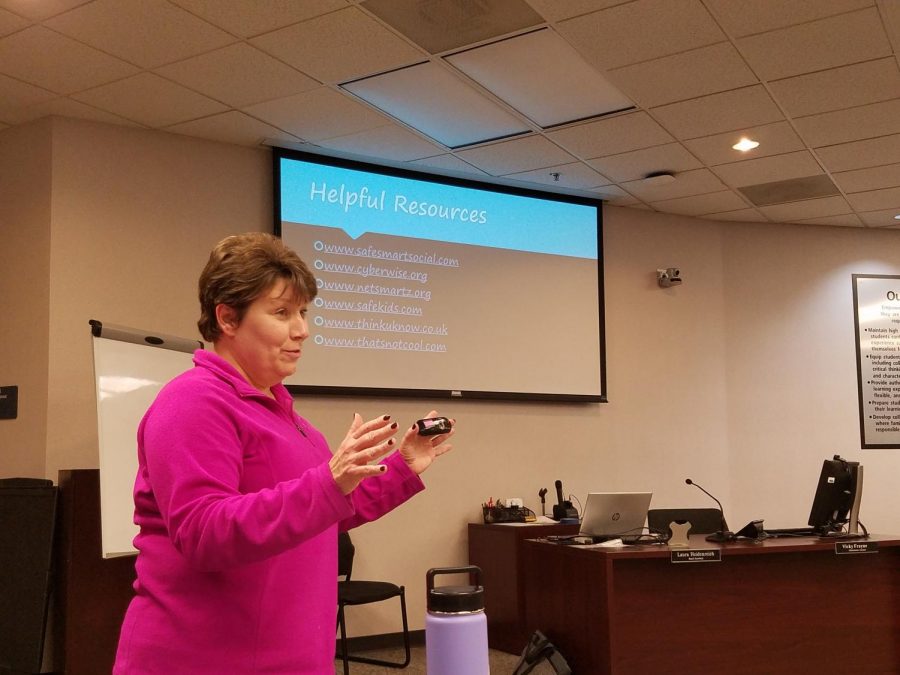Parents Learn Steps to Protect Their Children In the Online World at FHSD Event
Prevention Education Specialist Karen Loesch teaches parents about resources they can use to monitor their child’s online safety. (Photo by Chloe Horstman)
Published: November 20, 2019
Parents sat in a small circle and listened intently to the Protecting Your Children Online presentation held on Nov. 19 at the FHSD Administration building, as presenter and Prevention Education specialist Karen Loesch answered their questions about dangers that children could face in the online world.
The presentation took the place of this month’s Family Learning series that FHSD has been doing to educate parents on a wide variety of topics. It covered the often unnoticed risks children face on the internet, whether it be predators on online gaming services, cyberbullies, and ruthless social media stalkers. as well as the steps to protect their children as much as possible. The Family Learning series typically expects about fifty percent of the people who registered, but there was a small turnout to this event, as 25 registered but only three parents attended the meeting.
During the presentation, Loesch, who works for The Child Advocacy Center, showcased many different cases of child endangerment online, and asserted that the children particularly at risk are those who don’t have strong social connections and seek to fill that gap with people online- which is when predators see their opportunity to strike.
“Younger kids typically develop these trusting relationships,” Loesch said. “Online predators, which is who we want to warn the kids about, are very good at developing those relationships so that younger children actually get this sense of trust built up because this person is willing to listen to them, and they always take their side.”
In addition to carefully reading terms and conditions, avoiding sharing personal information and following the age restrictions on games or websites, Loesch stresses the importance of parents being present in their children’s social media lives.
“You need to insist on being friends with your kids online and playing the games that they play,” Loesch said. “Only then do you know the capabilities of that app or website or game. And only then will they be able to help protect their kids and develop that relationship.”
English teacher Jani Wilkens’ children have an open relationship with their parents about their social media accounts or other online activities, and occasionally Wilkens and her daughter will look through her daughter’s social media together, which fosters an open and trusting relationship that will serve to keep her kids safer online.
“They can share things with me, I’m not going to judge them or be mad about it if it’s something I wouldn’t be happy with,” Wilkens said. “I think if you have open lines of communication, then when those things come up, you can talk about them.”
According to Loesch, every time law enforcement and app designers create new safety measures, online predators will find a way to harm children, which is why parents need to be well informed of the potential threats their children may come into contact with.
“The internet is neither good or evil,” Loesch said. “The internet has become a necessity. They need to treat the internet like it’s a privilege. It is their responsibility as a parent to help [their children] navigate it safely, and having that open communication, because all kids are going to mess up sometimes.”









![JV Girls Basketball Takes A Win To FZE On The First Game Of The Season [Photo Gallery]](https://FHNtoday.com/wp-content/uploads/2024/12/voccer10.24_kwallace-3-300x200.jpg)
![It's Time for the BOE to Respect Student Input [Editorial]](https://FHNtoday.com/wp-content/uploads/2024/11/Untitled_Artwork-1-300x173.png)



